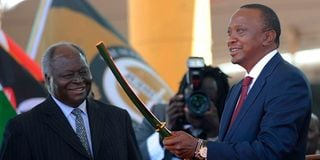Divisive populism, weak institutions a threat to orderly transfer of power

Former President Mwai Kibaki (left) hands over the presidency to Mr Uhuru Kenyatta on April 9, 2013.
What you need to know:
- Nearly all political transitions in Kenya have been prone to divisive populism linked to politicised ethnicity.
- None of last six elections since Kenya’s return to multiparty politics in 1992 can be unequivocally judged as a peaceful transfer of power.
Orderly transfer of power after elections is the platinum standard of a stable democracy. On the road to the August 9, 2022 election, Kenya is emerging as a posterchild of an emerging democracy besieged by resurgent populism. This casts a dark shadow over peaceful political transition after next year’s elections.
The United Democratic Alliance (Uda), a splinter faction of the ruling Jubilee Party, is riding the tidal wave of divisive populism fuelled by a new class-based ‘Hustler’ identity that casts wealth as a vice and poverty as a virtue to drive a wedge between the rich (dynasties) and the hustlers (the poor).
In May, “hustler rebels” and allied civil-society pundits won their first legal victory when five High Court judges dismissed the Constitution Amendment Bill, popularly referred to as the Building Bridges Initiative (BBI), as irregular, illegal and unconstitutional. Whatever the outcome of the long-awaited ruling by the Court of Appeal, the verdict dealt a death-blow to the government-backed plan. Then followed a string of electoral victories by Uda, culminating in the epic Kiambaa by-election.
Peaceful transitions are powerful indicators of democratic maturity, relative stability of governments, democratic consolidation, improved governance, functioning of civil society and resilience of institutions. Inversely, absence of peaceful handing over of power signifies a stalled or retreating democracy and undermines a country’s international reputation.
As a toxic doctrine that appeals to the raw emotions and preys on grievances of the ordinary people, populism is turning elections into triggers of violence and instability across the world.
Divisive populism is riding the crest of resurgent micro-nationalism, politicised ethnicity, deepening poverty, widening inequality gap and organised crime in a world increasingly characterised by isolationism and other anti-globalisation trends.
Humanitarian crisis
According to a 2014 study, 68 countries have never had a peaceful transition of power after an election since the dawn of democracy in modern times. Across the world, populism is exacerbating existing cleavages based on class, ethnicity, gender, generations, geography and religion. It is the most serious setback to what Samuel Huntington celebrated as the ‘Third Wave’ of democracy that swept Africa from the late 1980s.
Populism is an equal opportunity menace. In America, President Donald Trump rose to power on the crest of populism laced with racism. His refusal to concede after losing the 2020 presidential election to Joe Biden and failure to commit to a peaceful transition nearly hampered peaceful transfer of power.
In Africa, the populist euphoria that greeted Prime Minister Ahmed Abiy’s rise to power in Ethiopia in April 2018 has only worsened instability. Once on the trajectory of becoming one of Africa’s most stable and prosperous nations, Ethiopia has slipped into a deadly civil war that started in the Tigray region in November 2020.
In the absence of credible mediators and the fighting sides ruling out political negotiations, the war in Tigray has escalated, sucking in adjacent Amhara and Afar, as well as Eritrea and spawning a deadly humanitarian crisis and refugee influx into Sudan.
In a nuanced article, ‘How Far Can Populism Go in South Africa? (Foreign Affairs, May 7, 2019), the correspondent for the Economist in South Africa, Erin Conway-Smith, links the upsurge of divisive populism in South Africa to the rise of Julius Malema and his radical far-left Economic Freedom Fighters (EFF). But Malema is himself a product of the dangerous populism that fuelled xenophobic attacks, forcibly and ignominiously removed President Thabo Mbeki from power in September 2008, and swept Jacob Zuma to power.
The collapse of the nationalist consensus and elite fragmentation within the African National Congress (ANC) has undermined a peaceful handing over of power from Mbeki through Zuma to Cyril Ramaphosa.
Politicised ethnicity
The ongoing ‘hustler’ protests, looting of businesses, chaos and anarchy in South African cities should be an alarm bell to Kenya.
Nearly all political transitions in Kenya have been prone to divisive populism linked to politicised ethnicity. None of last six elections since Kenya’s return to multiparty politics in 1992 can be unequivocally judged as a peaceful transfer of power. Even the 2002 election, when Uhuru Kenyatta conceded defeat and Daniel Moi peacefully transferred the instruments of power to Mwai Kibaki was marred by election-related violence.
In Kenya, peaceful transitions have further been bedevilled by lack of strong democratic institutions and unwillingness by opposition parties to accept defeat or to serve as a loyal opposition. Soaring populism reflects a shared fear among the power elite that if a rival faction ascends to power, they might face political retaliation or retribution for alleged corruption and other misdeeds.
Almost echoing Trump, Kenya’s populists have pre-emptively claimed their victory risks being stolen by the so-called ‘deep state’. The road to 2022 is also heavily mined by organized crime and proliferation of militias or goons-for-hire.
The trouble with Kenya is the failure to create what renowned Sociologist C. Wright Mills defined in his influential 1956 classic as the Power Elite organised around strong political parties and pursuing national interests rather than the narrow short-term self-interests of its ethnic factions.
As the 2022 elections approach, there is need to create a new institution to neutralise divisive populism and manage this delicate transition.
Professor Peter Kagwanja is a former Government Adviser and currently Chief Executive of Africa Policy institute (Kenya).





